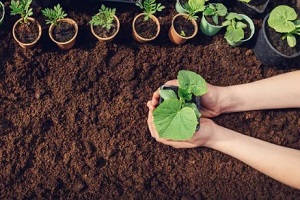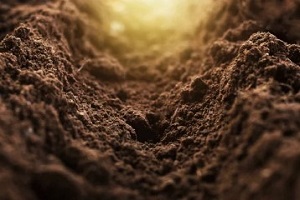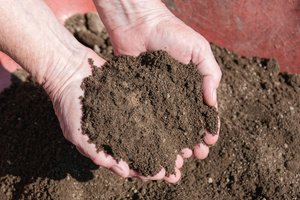 Spring is in the air, and it is time for planting. DIY potting soil can be a cost-effective and sustainable method of boosting the capacity of a garden or landscape planting project.
Spring is in the air, and it is time for planting. DIY potting soil can be a cost-effective and sustainable method of boosting the capacity of a garden or landscape planting project.
By following these “do-it-yourself” tips, you can improve the resiliency of your garden, while also saving substantially on maintenance.
Tips for Making Your Own DIY Potting Soil
Nutrient, PH balance and porousness of soil are important for flower and fresh vegetable growth. Some soils require treatment, like moistening or heat sterilization. Wearing a face mask is recommended during the preparation of soil mix ingredients to avoid inhalation of fine particle dust.
Select a large bag or plastic container or series of airtight storage bins for blending and storage of a soil batch so that it is ready for reuse in the future. Store soil containers in a dry environment for optimal results.
The Do’s and Don’ts for Mixing the Perfect Blend
DO use moisture retention ingredients to prevent plant parching.
A popular ingredient in many potting soils, peat moss is an organic gardening soil mix standard that improves the resilience of plants in dry climates. Coconut coir is another environmentally sound organic product, commonly used to substitute peat moss in planting soil blends.
Peat moss typically comes in dried bricks that can be moistened suitably for inclusion in soil mixing.
Hint: add a few drops of dishwashing soap per gallon of water. A total of about 20 gallons is required for a standard 3 cubic feet peat moss bundle.
DO add supplements to a soil mix for proper pH and nutrient composition.
Soils with acidic ingredients at the base can be tempered with supplements like limestone. Peat moss has about a 4.5 pH level, making it a desirable yet very acidic ingredient.
To improve the stability of a soil’s pH level, add limestone to peat moss or similarly acidic, coco coir and perlite mix. Nutrient booting supplements such as blood meal, bone meal, or fertilizer compost enrich a soil mix recipe for faster plant growth.
Soil experts recommend 10 lbs. of blood meal and 20 lbs. of bone meal per cubic yard of soil mix. Timed-release, fertilizer pellets can be used instead where a recipe calls for bone meal or blood meal ingredients. Add about two cups per 6.5 gallons of soil mix if substituting those ingredients with fertilizer pellets.
DO use drainage-promoting ingredients to reduce soil mix sogginess.
 Some gardens require additional drainage. Coarse sand is a common ingredient used in soil blends that enhances the aeration of plants over time. The benefit of adding coarse grain sand to an organic soil blend is composition porousness.
Some gardens require additional drainage. Coarse sand is a common ingredient used in soil blends that enhances the aeration of plants over time. The benefit of adding coarse grain sand to an organic soil blend is composition porousness.
Alternative soil mix recipe ingredients categorized as “drainage” types, are heat-treated volcanic rock or perlite and heat-treated mica or vermiculite. Perlite and vermiculite tend to induce more drainage, reducing soil clogging better than finer grades of sand will accomplish.
Perlite retains less water, but also fewer nutrients than vermiculite comparatively. Therefore, vermiculite is optimal for cultivating healthy tropical plant growth requiring damp conditions, and perlite is better for plants requiring drier soil that is similar to sand.
Like coarse builder’s sand, both perlite and vermiculite are commonly sold in the garden supply marketplace. For universal soil mix use, blend equal parts perlite, vermiculite, and/or sand for the best effect.
DO sift soil for proper texture before use or storage.
Similar to cooking recipes, the ingredients of a soil recipe may demand adjustment before the blend is precise in terms of composition, moisture, texture, and weight. If preparing a lighter soil, test the lift by running gloved fingers through the mix to determine if perlite or another pumice-type ingredient is needed to loosen it up.
If a new blend requires moistening or heat treatment due to an overly dry or sticky texture, adjust the soil with ingredients that promote drainage. A mesh metal hardware cloth stapled to a wooden frame is a good sifter tool for eliminating lumps during soil preparation. To prepare for storage, dampen and transfer to a clean, airtight bin.
DON’T add excessive amounts of weighty coarse sand to a soil mix.
Dry soils with coarse sand ingredients can weigh up to 100 lbs. per cubic foot. If a soil feels too heavy to lift, it usually means the ingredients contain at least 10 percent sand or more in the mix. Not all extra weight is a negative result, however, and soils with coarse sand drainage inputs in the blend tend to stabilize plants potted in top heavy containers.
Reduce heavy lifting with 5 to 8 pounds of perlite or vermiculite per cubic foot of soil for considerably lighter weighted composition soil than those with sand ingredients. Those substitutes provide the same aeration and drainage benefits as coarse sand.
Some soil recipes recommend adding equal portions of peat moss and perlite to a mix to lessen the weight making it appropriate for potted and vertical planting, and for use in recycled container gardens.
DON’T introduce unsterilized soil product ingredients for organic soil mixing.
 Soilless recipes designed for shallow potted gardens, require a separate combination of ingredients for temperate support of plant moisture. Equal parts of perlite and peat moss will control for insect eggs, spores, and weed infiltration, which has the potential to sabotage a garden.
Soilless recipes designed for shallow potted gardens, require a separate combination of ingredients for temperate support of plant moisture. Equal parts of perlite and peat moss will control for insect eggs, spores, and weed infiltration, which has the potential to sabotage a garden.
Purchasing garden soil ingredients rather than relying on the compost process has its benefits and drawbacks. Pre-mixed, commercial compost products reduce the time it will take to begin planting.
The drawback is that the ingredients and processing preparation of bagged commercial products may not be sterilized properly for planting organic herbs and vegetables. Product indications that ingredients are heat processed generally means they are sterilized for direct use.
Heat treatment of up to 200 degrees is required to sterilize soil ingredients properly. If you are in the market for high-quality soil mix ingredients that will maximize flower, herb, and vegetable garden growth, you need look no further than Dirt Connections. We are the soil treatment experts, Dirt Connections.
Summary

Dirt Connections was started with one goal in mind: providing quality residential and commercial construction services to clients on time and on budget. Reach out for more information on how we can support your next project.
For your convenience our estimates are free and by appointment. Call 703-940-9949 for a free estimate today!










































